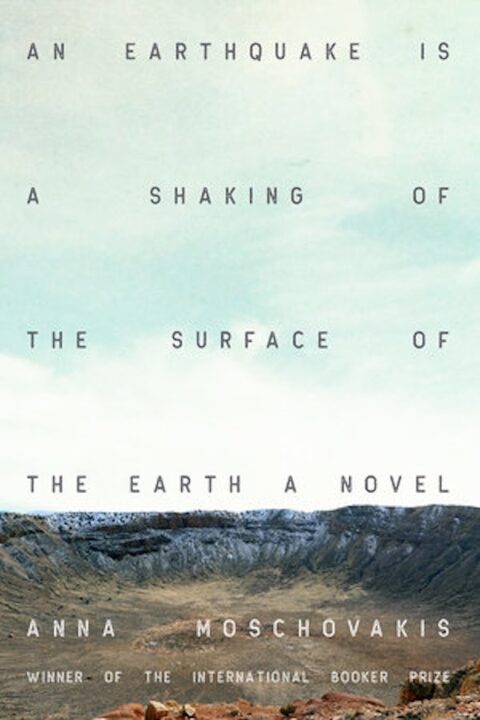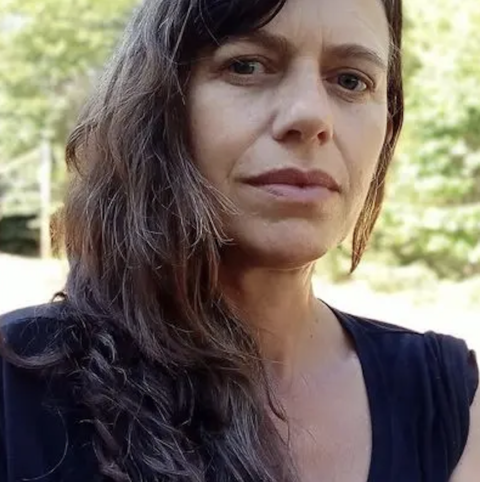In Anna Moschovakis’ An Earthquake Is a Shaking of the Surface of the Earth, the world is just as the title describes it — constantly quivering and disrupted. The planet, for unexplained reasons, is now dealing with “aftershocks or whatever these movements are,” the narrator explains. “These movements that convulse the ground beneath us, that almost never stop, not completely, so that now motion, rather than stillness, has become the rule. Stillness the exception that proves it.” Appropriately, excepting some mention of a “Center City,” there are few toeholds for the reader in terms of time or place.
 How do you live in a world that won’t stop shaking? The plot of the novel suggests that the answer is: manically, crazed. Moschovakis only barely gestures toward how the earth’s predicament affects the world at large — people stop paying their mortgages as their homes crumble, but some still go dancing — and instead focuses on the interior life of its narrator, who is unusually moved to want to kill a former roommate, Tala. There’s no drama predicating this decision, no inciting incident, just a kind of variation on the death drive that the narrator now wants to project on somebody else: “What if the perfect death didn’t have to be mine?” For a failed actor who’s tired of acting, a murder seems to qualify, in the narrator’s mind, as something authentic.
How do you live in a world that won’t stop shaking? The plot of the novel suggests that the answer is: manically, crazed. Moschovakis only barely gestures toward how the earth’s predicament affects the world at large — people stop paying their mortgages as their homes crumble, but some still go dancing — and instead focuses on the interior life of its narrator, who is unusually moved to want to kill a former roommate, Tala. There’s no drama predicating this decision, no inciting incident, just a kind of variation on the death drive that the narrator now wants to project on somebody else: “What if the perfect death didn’t have to be mine?” For a failed actor who’s tired of acting, a murder seems to qualify, in the narrator’s mind, as something authentic.
It’s a strange way to set up a character, but part of Moschovakis’ goal in this slippery, at times abstruse book is to shake up narrative expectations as much as anything else. The narrator’s urge to kill Tala isn’t framed as the end result of some ongoing tension; it’s presented more the kind of thing that novels ought to have, a simulacrum of conflict. It’s a metafictional somersault of the sort the late Paul Auster sometimes traded in, where characters were avatars of the concept of character and not realistic figures, something Auster himself borrowed from French absurdists. (As it happens, Moschovakis is an accomplished French translator, receiving an International Booker Prize for her translation of David Diop’s novel, At Night All Blood Is Black.)
Moschovakis’ take on the idea is to push it to an extreme: It’s not just character that’s disrupted but structure and the use of words themselves, a theme in her poetry. Indeed, the only reliable tactile thing in the narrative is the series of notebooks the character keeps. There, she logs notes about her time as an actor and acting student, or collects stray words, especially cliches, which she assays for meaning. Chapters end with accidental poetry of abandoned phrasings, as if leftovers from a working document. (“I might have something better soon / there are fixtures / they break / revolver, revolve.”)
There is just enough forward movement in the novel to keep it from pixelating and abstracting, but only just. One encounters the search for Tala, the narrator’s memories of acting, the neighbor who arrives with brochures promoting an institution offering a clearer, saner life. “What did you do when you were most yourself?” it reads. “When did you stop? What would it take for you to do it again?” A P. O. Box listed at the brochure — that, combined with the paranoia the narrator is working through, echoes the W.A.S.T.E. secret society in Thomas Pynchon’s The Crying of Lot 49.
The pleasure of the novel derives from its tension between the narrator’s urge to organize — she makes lists, fills notebooks, takes classes — set against Moschovakis’ determination to question the meaning of that organization, to mess with language and existence, and hold it up to scrutiny. Sometimes this takes the form of philosophical musings: “I am suggesting a problem not with the world but with the self. A problem with, or of, my self.”
Sometimes it rages: “But I have something, don’t I? Mustn’t I? Maybe all I have is a lack of boundaries, a lack of obedience to boundaries. No borders, we would chant. No nations. Not even the nation of the self.”
Sometimes it comes in the flat platitudes of brochure copy: “There is no solid self and no brute facts. No way to make sense of and be at home in the world.”
 But Moschovakis is mainly pointing to storytelling as suspect — that narrative can be pernicious, or inauthentic, unfit to clarify what it means to be a person in the world. Late in the story, a character tells the narrator this: “When you have made up a story in your head as a way of connecting observations or experiences that don’t easily add up, you can get attached to the story in a way that is similar to the way you can get attached to the story of an experience that you had but that did not make sense because you weren’t given all of the information necessary to make sense of it at the time.”
But Moschovakis is mainly pointing to storytelling as suspect — that narrative can be pernicious, or inauthentic, unfit to clarify what it means to be a person in the world. Late in the story, a character tells the narrator this: “When you have made up a story in your head as a way of connecting observations or experiences that don’t easily add up, you can get attached to the story in a way that is similar to the way you can get attached to the story of an experience that you had but that did not make sense because you weren’t given all of the information necessary to make sense of it at the time.”
In other words: Stories are imperfect, so it’s better to try to capture the imperfections. It’s similar to what Joan Didion was really getting at in her misunderstood line that “we tell ourselves stories in order to live.” The line is not a cheerful prompt to find joy in storytelling, but recognizes storytelling as a survival instinct, as a way to sort out a world that won’t be sorted, that keeps delivering earthquakes and trauma.
This is all a tricky business for a novelist to navigate. But it’s one that Moschovakis — who’s played with Oulipian modes in her poetry and has translated the likes of Annie Ernaux and Robert Bresson — strides confidently into. Although the narrative is deliberately unsettled, it never feels random, and the narrator’s melancholic vibe is engrossing, even (to use that book club cliche) likable. “Is this true, or does it only feel true?” she asks herself, a question any reader of a novel has to ask. Or, more bluntly and a little funnier: “cognitive dissonance points to a faulty expectation.”
Moschovakis’ disinterest in the details of the planet’s calamity is purposeful — it removes the story from the tropes of apocalyptic fiction and science fiction and thrusts it more into the present. The quaking is happening to language and identity. We don’t have to wonder what might happen to our minds if the world starts shaking. It’s shaking now. It always has been.
[Published on November 19, 2024 by Soft Skull Press, 208 pages, $16.95 paperback]